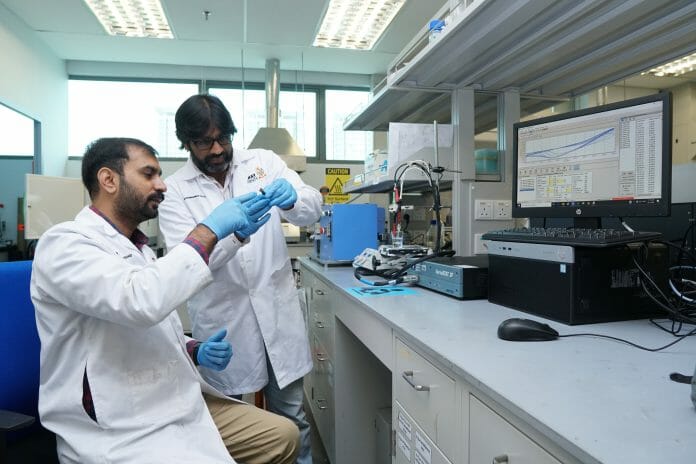Sunway University, Sunway Innovation Labs (iLabs), and Daikin Refrigeration Malaysia Sdn Bhd today announced that their pilot trial of graphene-based nano-fluid in industrial chillers has successfully reduced daily energy consumption by up to 10% (kwH) consistently over a trial period of one-month, compared to when a chiller is running using regular tap water.
The nano-fluid results in almost 40% faster heat transfer, i.e., transferring the same amount of heat in a much shorter time. Resultingly, the chiller consumes less energy as it reached the setpoint temperature faster.
Chillers are one of the largest electricity consumers in a building and could consume up to 40% of a building’s total energy use in commercial and industrial buildings.
As an illustration, a 500 ton water-cooled chiller that has an efficiency of 0.80kW/ton operated at 8 hours per day would utilise 3,200kWh of electricity. At an RM/kWH rate of RM 0.51, the chiller would cost RM 1,632 to operate daily. With the decreased daily energy consumption of 10% kWh, at 2,880kWh, that would mean 10% percent savings in daily energy costs amounting to RM 381,888 for 260 working days.
The proprietary heat transfer nanofluid which improves energy efficiency in industrial applications was developed by Sunway University’s Graphene and Advanced 2D Materials Research Group (GAMRG).
The nanofluid uses graphene nanoparticles (a small particle that ranges between 1 to 1000 nanometres in size) that are highly stable in the suspended state. These particles enhances the thermal efficiency (heat transfer rate) by several folds, compared to the traditional fluids, such as water or ethylene glycol.
This means the new graphene-based nano-fluid has better cooling performance, lower electricity consumption, extends life of heating, ventilation, and air-conditioning (HVAC) equipment while keeping maintenance costs down, and above all, lowers the carbon footprint.
“Air conditioning is an inevitable part of daily living in today’s environment. While we all appreciate the comfort of air conditioning, we must also consider its impact on the environment. Air conditioners use refrigerants and consume large amounts of electricity, resulting in gaseous emissions that contribute to global warming and ozone layer depletion. Our graphene-based invention is an energy-efficient heat transfer nanofluid that has been proven effective in both the laboratory and real life. It is cost-effective, environmentally-friendly, and are safe to be used in industry chillers,” says the principal researcher of the project Prof. Mohammad Khalid, the Head of GAMRG, Sunway University.
“We aim to complete the validation trial which will ensure reproducibility by the first quarter of 2022. We welcome collaboration with partners especially manufacturers and real estate managers, who would like to work with to commercialize the graphene-based nano-coolants. This includes companies who would like to adopt this technology to improve their energy utilization and to move a step closer of becoming a carbon-neutral organization,” said Karen Lau, Head of Sunway iLabs Foundry.
“At Sunway University, planetary health and sustainability are our key research focus, where we co-create innovative solutions with our industry partners in areas such as energy efficiency, renewable energy, and energy storage such as battery and supercapacitors, CO2 capture and utilization. These research projects are not only aligned to the 10-10 MySTIE identified under the 12th Malaysia Plan, but also the UN Sustainable Development Goals”, said Prof. Mahendhiran Nair, the Pro-Vice-Chancellor, Research Engagement & Impact of Sunway University.
The 12th Malaysia Plan (RMK-12) announced by Prime Minister Datuk Seri Ismail Sabri Yaakob for 2021 until 2025 focuses on advancing sustainability, and which includes ensuring sustainable utilization of energy and committing to a carbon-neutral nation by 2050.









